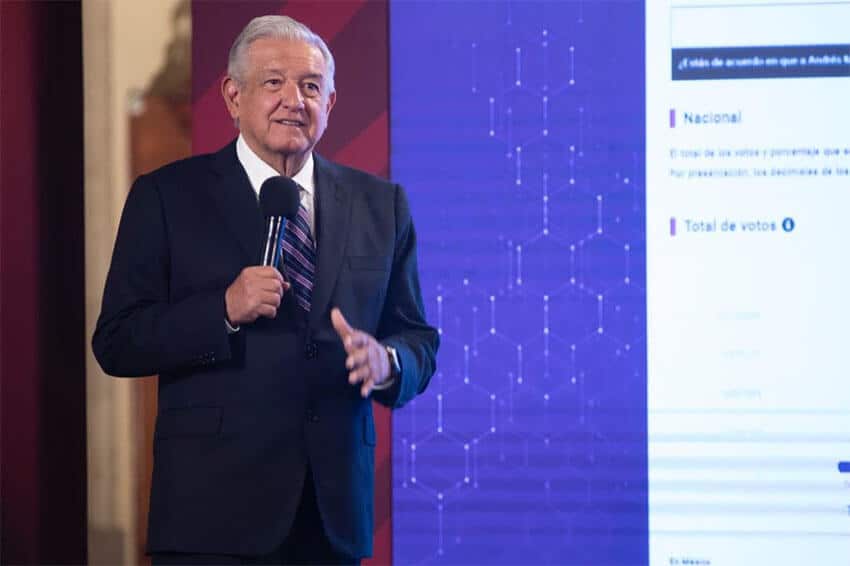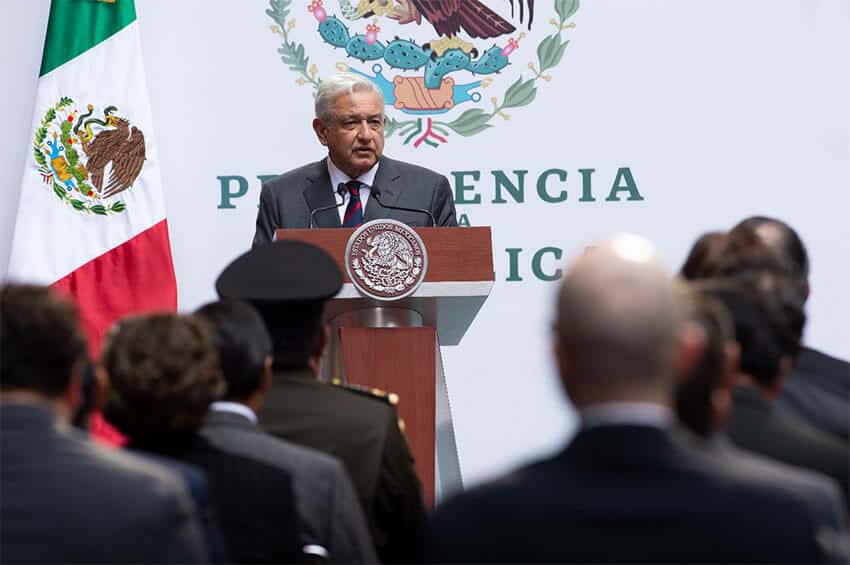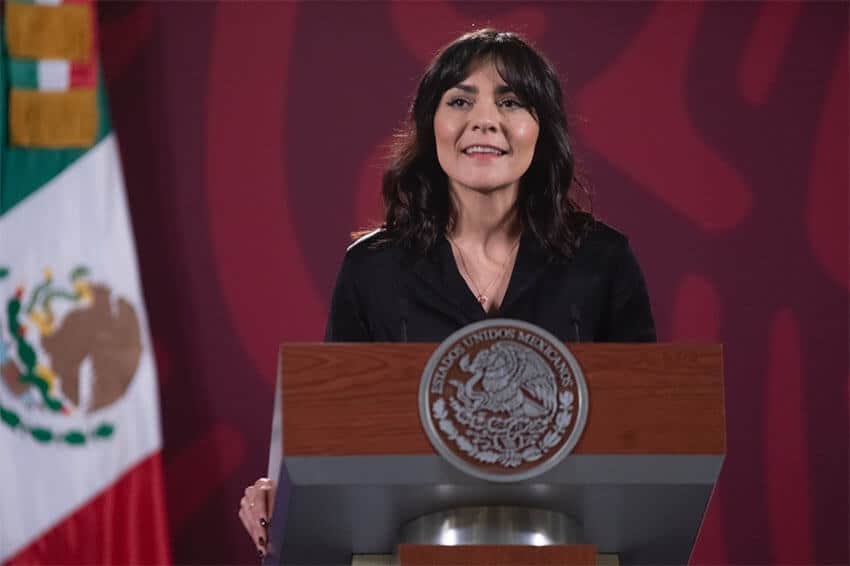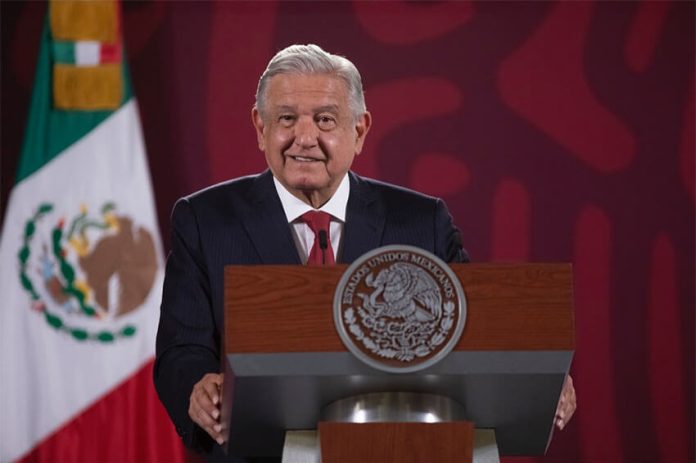Voters hit the polls last Sunday to decide whether President López Obrador should remain in office. The president justified the vote as an exercise in participatory democracy, while detractors have labeled his series of referendums as little more than a political stunt.
Monday
“It was a complete success,” the president declared of Sunday’s vote. “People acted with a lot of responsibility, millions of Mexicans … reaffirming that it’s the people who rule … now we are in a new stage, not only of representative democracy, but of participatory democracy,” he said.
More than 90% voted for the tabasqueño to remain in office on Sunday, but the turnout was under 20%. The president blamed the National Electoral Institute (INE) for the low turnout, claiming it had in effect boycotted the vote by providing a minimal number of polling stations. The INE replied that the government had boycotted the referendum by limiting its budget.
Despite the electoral ambiguities, López Obrador was already looking ahead. He continued his campaign to split the opposition’s united front against the electricity reform. “What does the Institutional Revolutionary Party (PRI) gain by allying with the National Action Party (PAN)? Nothing!” he declared, and claimed only PAN would benefit from the coalition.

Now safe in his post, the president decided to take a couple of days off. He announced there would only be one other morning news conference this week, to take place on Wednesday while Tuesday he would give a quarterly report.
Tuesday
López Obrador waited until the late afternoon to address the public, giving a quarterly review from the National Palace that marked the first 100 days of his government’s fourth year.
The president took the opportunity to lay out some of the government’s main achievements, as is customary for any extended AMLO speech. He focused on improvements in the minimum wage, social security, the recently opened Felipe Ángeles airport (AIFA) and the Dos Bocas oil refinery in Tabasco which he said would be completed in July, among other accomplishments.
There was a warning to lawmakers that that the upcoming vote on the electricity reform would show which of them stand with the people and which represent corporate interests. Part of the reform would nationalize lithium, and the president said that if the reform failed he would send a separate initiative for its nationalization.
On violence and criminality, López Obrador said his government had things under control. “Fortunately, from the first day of government we went to the root of the problem. We’ve faced the problems we inherited with welfare programs. With good results,” he said. However, he conceded that femicides, extortion and theft on public transit had risen.

The quarterly review concluded on a religious note. “Do not forget that we must seek material well-being, but also the well-being of the soul, because man can not live by bread alone,” the president said.
Wednesday
Federal lie detector Elizabeth García Vilchis ran through the week’s media mishaps. She denied millions of public medicines had expired in warehouses and confirmed that an airplane that split in two on a runway wasn’t at the AIFA, but in Costa Rica.
García added that former president Vicente Fox wasn’t to be trusted on Sunday’s vote after posting an erroneous video.
The president said he didn’t know how much it would costs Emilio Lozoya to get out of prison. The former Pemex CEO, who’s charged with corruption, had a US $10 million settlement offer rejected by the state-owned oil company.
The tabasqueño was more riled by the appearance of an Italian energy company lobbyist in the House of Deputies, where the electricity reform was being debated. He showed a photo of the lobbyist sitting next to Edna Díaz, a representative with the Democratic Revolution Party (PRD).

“They call him a lobbyist — an intermediary, a kind of corporate influence peddler … In a brazen way he went to the headquarters of the deputies … That’s why it will be very important on Sunday to see how the popular representatives vote,” he said.
Later in the conference, the president offered an example of the power of energy companies. He said Venezuela opposition leader Juan Guaidó was once revered by the U.S. Senate for his political struggle against the incumbent dictatorship in his country, but now there was a war in Ukraine, energy companies were embracing the Venezuelan regime and Guaidó had been forgotten.”Their god is money,” the president concluded.
However, the conference ended on an affectionate note. López Obrador wished viewers and those in attendance a “Holy Week in peace. In tranquility, with the family … with many hugs. Hugs, hugs, hugs,” before heading off for a short break from the mañaneras.
Thursday
The president took Thursday and Friday off for Easter.
López Obrador has previously said he doesn’t follow any religious institution, but nonetheless considers himself a man of faith. The morning conferences sometimes sound religious in tone and the president has been known to offer the odd parable. Even the name attributed to AMLO’s political movement — the Fourth Transformation — sounds like a phrase from the New Testament.
Recently, the president made a joke in which he placed himself as the son of God. He sarcastically claimed he could change the color of the sea and turn hell into paradise.
Friday
Catholicism is integral to Mexican identity. The country has the second largest number of Catholics anywhere in the world, behind only Brazil. But it’s arguably more dedicated to the faith than its South American rival, with a higher proportion of Mexico’s population identifying as Catholic.
However, Catholicism in Mexico isn’t a carbon copy of the creeds of the Vatican. While the Conquest was a story of domination, it was also a tale of marriage. Pre-Hispanic tradition is pervasive in the country’s Catholicism and in Easter that’s best represented in the Tewerichic, the ritual of the Rarámuri people in Chihuahua.
The Tewerichic celebration centers on a spiritual conflict between God and the devil. The story goes that the devil has forced God to drink tesgüino, a sacred alcoholic drink, making him weak and vulnerable. The Rarámuri join the drama to protect God and his wife until they fully recover.
The community is divided into two groups to act out the ceremony. Some become allies of the devil, while others play the warriors who defend God.
Mexico News Daily
